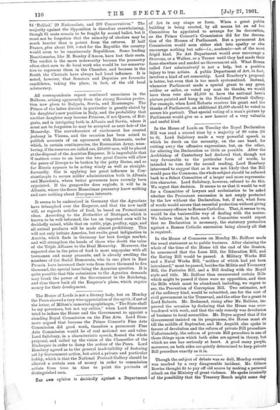In the House of Commons on Monday Mr. Balfour made
the usual statement as to public business. After claiming the whole of the time of the House till the end of the Session, he announced that the Loan Bill, the Education Bill, and the Rating Bill would be passed. A Military Works Bill and a Naval Works Bill, " neither of which had yet been introduced," must be passed, besides the Militia and Yeomanry Bill, the Factories Bill, and a Bill dealing with the Royal style and title. Mr. Balfour then enumerated certain Bills which might be passed if there were no opposition, and then the Bills which must be abandoned, including, we regret to see, the Prevention of Corruption Bill. Two estimates, not of the ordinary kind, would be submitted, one for the cost of civil government in the Transvaal, and the other for a grant to Lord Roberts. Mr. Redmond, rising after Mr. Balfour, im- proved the occasion by declaring that the House was over- burdened with work, and that the only remedy was devolution of business to local assemblies. Mr. Bryce argued that if the Government insisted on its programme, the House must sit till the middle of September, and Mr. Asquith also spoke in favour of devolution and the reform of private Bill procedure. Unfortunately, the reform of private Bill procedure is one of those things upon which both sides are agreed in theory, but which no one has seriously at heart. A good many people, moreover, on both sides are quietly determined to keep private Bill procedure exactly as it is.


































 Previous page
Previous page